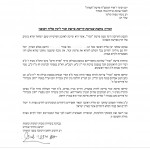Thursday, February 22, 2018, 11:18 The following is a translation of the letter Rabbi Yehoshua Schmidt sent to the Prison Service Commander, Lieutenant General Ofra Kliger, on Wednesday, February 21, on behalf of his son-in-law regarding his request to hear a reading of Parshat Zachor on Shabbat Zachor.
Yom Revi’i, the 6th of Adar, 5778, Parshat Tetzaveh
Lieutenant General Ofra Kliger
Prison Service Commander
Re: Request to hear reading of Parshat Zachor for Yinon Eliya Reuveni
Dear Lieutenant General Ofra Kliger,
This coming Shabbat is the Shabbat of Parshat Zachor, one of the four Torah portions read on Shabbat at this time of year in addition to the weekly Torah portion. I ask that my son-in-law, Yinon Eliya Reuveni, ID no. ——, Prisoner no. ——, who is sitting in the Sharon Prison, be permitted to read Parshat Zachor, along with millions of Jews all over the world. There is no reason for you to prevent my son-in-law, who is a religious man, from fulfilling this obligation.
Reading Parshat Zachor is special in that its obligation is binding according to the Torah, as stated in the Shulchan Arukh Orach Chayim paragraph 685, sub-section 7, according to most of the Rishonim, Tosefot Tractate Brachot 13., Rashba, Rosh in his rulings on Brachot 47:, Sefer HaChinukh 403, and others
Parshat Zachor must be read from a ritually acceptable Sefer Torah according to the Gemara in Tractate Megillah 18., and also the Magen Avraham wrote thus at the end of paragraph 135, and also Maran HaRav Ovadiah Yosef, ztz”l, ruled thus on page five of his book, Hazon Ovadiah, about Purim.
The reading of Parshat Zachor must be “with ten”, that is with a minyan of men, according to the above-mentioned Shulchan Arukh in paragraph 685, sub-section 7, and there are those who have written that the minyan is an obligation according to the Torah. Maran HaRav Ovadiah Yosef wrote on page six of his book Hazon Ovadiah, about Purim, that the obligation to read Parshat Zachor is specifically with a minyan.
Therefore I ask that my son-in-law, Yinon Eliya Reuveni and the other Jewish prisoners interested in fulfilling this commandment, be allowed to fulfill it in the Jewish prisons of the Land of Israel.
I regard this as your religious, moral and humane obligation to ensure that [every prisoner] interested be able to fulfill this great and important commandment.
With blessing of good tidings,
Yehoshua Mordechai Schmidt
Rabbi of Shavei Shomron and the Head of the Shavei Shomron Yeshiva

